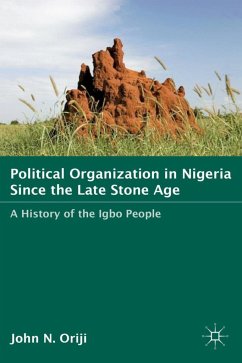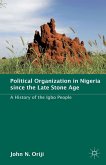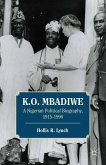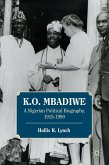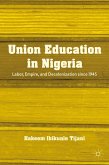Although the Igbo constitute one of the largest ethnic nationalities of Nigeria and the West African sub-region, little is known about their political history before the Trans-Atlantic slave trade. This book is a pioneer study of the broad changes Igbo political systems have undergone since the prehistoric period.
Hinweis: Dieser Artikel kann nur an eine deutsche Lieferadresse ausgeliefert werden.
Hinweis: Dieser Artikel kann nur an eine deutsche Lieferadresse ausgeliefert werden.
'Recommended.' - CHOICE
"This book can be regarded as a pioneer study of the Igbo political organizations to the extent that no other study has in a systematic and sustained manner gone as far back as tracing the genesis of such political structures to the origins of the Igbo people. The periodization is quite revealing and very significant. It addresses one of the major limitations of most existing studies on the Igbo which lump the history of the people before European colonial rule under one bloc of time, 'pre-colonial.' Such studies fail to recognize the changing dynamics of a period in Igbo history which witnessed so much change and adaptation as this study has demonstrated. These observations underscore the significance of this book and its originality." - Gloria Chuku, Associate Professor, Africana Studies Department, University of Maryland, Baltimore County
"By focusing on the longue durée and on change over time, this book transforms our understanding of Igbo political history. John Oriji's prodigious research, comparative method, and historical approach sweep away old assumptions about the Igbo as a supposedly 'stateless' people who lived in an 'acephalous' society. This work marks a new beginning in the historical study of Igbo political systems, and is a welcome addition to Igbo studies, Nigerian historiography, and African history generally." - Douglas B. Chambers, Associate Professor of African History at the University of SouthernMississippi and author of Murder at Montpelier: Igbo Africans in Virginia
"In this timely book John Oriji uses the diachronic and multi-disciplinary approach to explain changes undergone by Igbo political systems since the Late Stone Age. It is a courageous tour-de-force that threads deftly - and triumphantly - along the rugged and uneven terrain of Igbo history. It deserves to be widely read." - G. N. Uzoigwe, Professor, Formerly Dean, College of Humanities and Social Sciences, Imo State University; Head, Department of History, Mississippi State University
"This book can be regarded as a pioneer study of the Igbo political organizations to the extent that no other study has in a systematic and sustained manner gone as far back as tracing the genesis of such political structures to the origins of the Igbo people. The periodization is quite revealing and very significant. It addresses one of the major limitations of most existing studies on the Igbo which lump the history of the people before European colonial rule under one bloc of time, 'pre-colonial.' Such studies fail to recognize the changing dynamics of a period in Igbo history which witnessed so much change and adaptation as this study has demonstrated. These observations underscore the significance of this book and its originality." - Gloria Chuku, Associate Professor, Africana Studies Department, University of Maryland, Baltimore County
"By focusing on the longue durée and on change over time, this book transforms our understanding of Igbo political history. John Oriji's prodigious research, comparative method, and historical approach sweep away old assumptions about the Igbo as a supposedly 'stateless' people who lived in an 'acephalous' society. This work marks a new beginning in the historical study of Igbo political systems, and is a welcome addition to Igbo studies, Nigerian historiography, and African history generally." - Douglas B. Chambers, Associate Professor of African History at the University of SouthernMississippi and author of Murder at Montpelier: Igbo Africans in Virginia
"In this timely book John Oriji uses the diachronic and multi-disciplinary approach to explain changes undergone by Igbo political systems since the Late Stone Age. It is a courageous tour-de-force that threads deftly - and triumphantly - along the rugged and uneven terrain of Igbo history. It deserves to be widely read." - G. N. Uzoigwe, Professor, Formerly Dean, College of Humanities and Social Sciences, Imo State University; Head, Department of History, Mississippi State University

